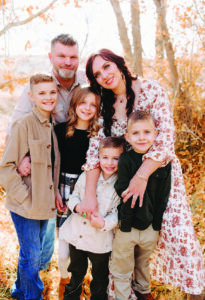
by John Dowd
For many who return from military service, adjusting to civilian life can be difficult. This is doubly true when they come home wounded. For Jerry Browe, a retired Marine, home life and picking up the pieces after his injury was tough. Fortunately, his community was there to help, and Browe, after looking back at his journey, is more than excited for his future.
Browe served 18 years in the United States Marine Corps. He was primarily an Explosive Ordinance Disposal Technician (EOD), or bomb technician. A couple of years ago he retired due to a traumatic brain injury he sustained in a parachute training incident. According to him, after several incidents during his service and this, he was finally retired. However, this last injury was severe. He was in out-patient care for over a year and received memory, speech and cognitive therapy. Browe explained that he still has surgeries he will need to undergo on his legs, which will put him in a wheelchair for an extended period of time.
During his treatment, he flew back and forth between home in Montana and North Carolina. He wanted his four kids to be able to stay in Montana, where they have an already established support system, during the difficult time. With military retirement benefits not kicking in for much of that time, he was forced to pay for a lot of the travel out of pocket. Though he is glad he kept his family home, it was financially difficult.
After returning home, even after his series of treatments, he had trouble getting hired. Some of this was due to both mental and physical difficulties resulting from his injuries. On top of that, he still gets weekly therapy sessions, which many employers find troubling.
After a long struggle, last year Browe was a recipient of Wheels for a Warrior, a Ravalli County nonprofit organized to help local veterans. The group gives a vehicle to a veteran every year. According to Browe, this was a particular blessing because, at the time, the family only had one working vehicle. Without the vehicle, the weekly appointments and the strain on family activities was taking its toll. The new vehicle also gave him reliable transportation, which had been another knock against finding a job.
“The car was a huge blessing,” said Browe. Along with the vehicle, the community helped in other ways, covering a lot of the costs, including insurance for the vehicle for a year. “This gave me the ability to go out there and continue my school and go to my appointments,” said Browe.
The help allowed him to finish his Associate of Science degree from Bitterroot College and he is now attending Oregon State University, online, to get a degree in fisheries, wildlife and conservation sciences. In the same vein of conservation, he started on with Bitterroot Water Partnership. Browe was more than thrilled for the opportunity.
“Even knowing my difficulties and all my appointments, they still took me on,” said Browe of Bitterroot Water Partnership. “They are not affiliated with veterans; they didn’t have to do that.”
In the last few months, Browe signed on for another year with the Partnership, this time as a permanent part-time employee. He is now a field manager and “doing conservation which makes me feel like I’m doing something important again,” he said. Part of his job is to help organize people doing various conservation work, such as clearing trails and stream-side restoration.
He is also working with other groups and nonprofits on prospective projects to connect veterans with conservation, locally. He is excited for this, saying it could be a big deal. For him, conservation has always been a huge thing, keeping nature and the environment protected for future generations.
According to Browe, coming from being a bomb tech, traveling all over the world and having people relying on him, to feeling like a burden, has been a difficult journey. Coming back from all that to civilian life, “you feel kinda lost.” Now, with everyone’s help, “I have my dignity back.” He also said he feels like he can be a proud role model for his kids again, who he now loves to share his conservation work with. “My kids will still be able to fish in the places I fished,” said Browe.
Browe hopes one day to be a Fisheries Biologist. He explained that a huge benefit of his job is that he is already working with the people doing this. Since he will stay in the area, he is working with the people that could one day hire him.
Looking back on the last couple years, especially the last year, he is humbled. “For so many people to do this just to help someone else,” it has been “the largest God-send,” said Browe.